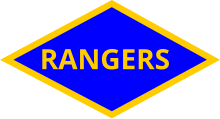4th Ranger Battalion
| 4th Ranger Battalion | |
|---|---|
 WWII Ranger Battalions' shoulder sleeve insignia | |
| Active | 1943–1945 |
| Country | |
| Branch | |
| Type | Special Operations Light Infantry |
| Size | battalion |
| Engagements | World War II |
| Commanders | |
| Notable commanders | Roy Murray |
Activated on 29 May 1943 in Tunisia, 4th Ranger Battalion was a Ranger unit in the United States Army during World War II.
Formation
After the success of 1st Ranger Battalion in the North Africa campaign, the Army saw the merit in small special operations units. Portions of 1st Ranger Battalion was split into 2nd, 3rd and 4th Ranger Battalions. The battalion was formed from American volunteers in North Africa.[1]
Training
Much like their predecessor, 4th Ranger Battalion had a strict training regimen, directed by William Orlando Darby. 3rd and 4th Battalions trained alongside each other, with members of 1st Battalion acting as training cadre. Passing along the lessons taught by the British 3 Commando Brigade, the Rangers engaged in rough training, including live-fire exercises (an uncommon practice at the time). Major Roy Murray took command of the Rangers as they prepared for their first mission.
Combat
On 10 July 1943, 4th Battalion, along with 1st and 3rd spearheaded Seventh Army's Amphibious Battle of Gela and Licata, beginning the Allied invasion of Sicily. Arriving ahead of the 1st Infantry Division, the Rangers quickly encountered the Italian 4th "Livorno" Division and the Hermann Goering Division.
Facing an overwhelming surprise attack, the Livorno Division surrendered. The Hermann Goering Division was pushed back into the city of Messina where it held off the Allied forces for the remaining German forces to escape.
The Battalion suffered heavy casualties during the Battle of Cisterna and it; along with the 1st and 3rd Ranger Battalion, were virtually destroyed and were subsequently disbanded.[2]
See also
References
- ^ Cawthorne, Nigel, The Mammoth Book of Inside the Elite Forces, Robinson, 2008 ISBN 1845298217 ISBN 978-1845298210
- ^ Cawthorne, Nigel, The Mammoth Book of Inside the Elite Forces, Robinson, 2008 ISBN 1845298217 ISBN 978-1845298210
- Lock, John D. and Moore, Harold G. To Fight With Intrepidity: The Complete History of the U.S. Army Rangers 1622 to Present Fenestra Books, 2001 ISBN 1-58736-064-0
- ArmyRanger.com's history of the WWII Ranger Battalions
- Ranger.org's history of the WWII Ranger Battalions

